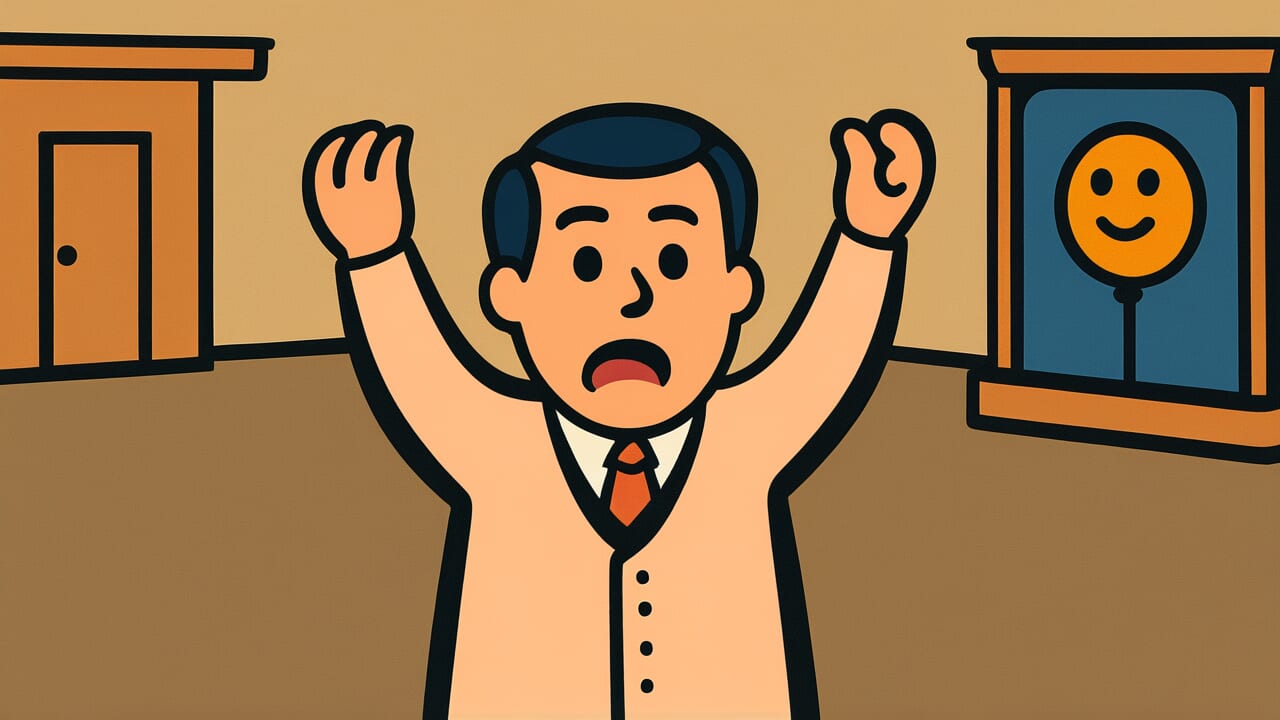How to Read “Amazement comes to pay its respects”
Akire ga rei ni kuru
Meaning of “Amazement comes to pay its respects”
“Amazement comes to pay its respects” is a phrase that exaggerates how shocked you are. It means you’re so amazed that regular amazement isn’t enough. You’re beyond shocked, and then even more shock comes on top of that.
You use this phrase when someone does or says something so ridiculous that you lose the energy to even get angry. It emphasizes how extreme your shock is, much more than just saying “I’m amazed.”
Today, you can use this phrase when you face something incredibly unreasonable. It helps you show others just how shocked you really are.
The phrase has humor in it. It doesn’t mean you’re seriously angry. Instead, it suggests you can only laugh at the situation.
It describes a state where your amazement goes full circle. You reach a point of acceptance or understanding. This is a uniquely Japanese way of expressing deep feelings.
Origin and Etymology
There are no clear written records about where this proverb came from. But we can learn interesting things by looking at how the words work together.
“Amazement comes to pay its respects” uses a technique called personification. It treats “amazement” like a person. The “amazement” comes to “pay respects” like a visitor would.
The word “respects” here means a visit or greeting in old Japanese. It’s used the same way in phrases like “New Year’s greetings” or “summer greeting visits.”
The phrase creates a funny picture. Your amazement is so strong that it leaves, then comes back again like a polite visitor. It’s like amazement returns for a second visit.
This is an even bigger exaggeration than “being shocked.” It means you get shocked, and then more shock comes on top of that. It’s like getting “change back” from your amazement.
During the Edo period, common people loved to play with words. They often personified emotions. This proverb probably came from that playful spirit.
By expressing everyday amazement with humor and exaggeration, people could make a stronger impression on others.
Usage Examples
- When I heard his excuse, I thought “this is what ‘Amazement comes to pay its respects’ really means”
- He forgot our promise three times in a row. Now it’s at the “Amazement comes to pay its respects” level
Universal Wisdom
The proverb “Amazement comes to pay its respects” shows us something strange about human emotions. We can get angry or surprised up to a certain point. But when things go too far, our emotions go full circle and reach a different state.
This is like a defense system for our hearts. If we got fully angry at every unfair thing, our hearts couldn’t handle it. So when we pass a certain limit, anger turns into amazement.
When even amazement reaches its peak, we can only laugh or give up. This is how our minds protect us.
Our ancestors watched this emotional change carefully. They expressed it by personifying amazement as something that “comes to pay respects.”
This phrase contains wisdom. It tells us that human emotions have limits. When we pass those limits, we can gain a new way of seeing things.
Sometimes, being completely amazed actually helps us calm down. Instead of being controlled by anger, we pass through amazement first. This helps us see things more clearly.
The proverb teaches us something important with humor. When emotions threaten to overwhelm us, we should step back and look at the situation calmly.
When AI Hears This
Emotions have a structure similar to “energy levels” in physics. Anger and amazement are high-energy states. Maintaining these states costs a lot of psychological energy. The human brain is designed to save energy, so high-energy states always try to move to low-energy states. This is the natural cooling process of emotions.
What’s interesting is that being amazed actually means you’re investing a lot of emotional energy into your relationship with someone. For example, boiling water requires heat energy. But after it slowly cools, impurities settle and the water becomes clearer.
Similarly, a relationship that shakes your emotions to the point of amazement can transform into gratitude after cooling. You might think “that time really taught me something.”
This change cannot be reversed. In physics, when a hot object touches a cold object, heat always flows from hot to cold. It never goes back. Emotions work the same way.
Once you invest a lot of energy into a relationship, it can’t go back to simple indifference. After the energy is released, what remains is a stable bond. This takes the form of respect or gratitude.
Amazement turning into respect isn’t an accident. It’s a necessary result that follows the entropy increase law of emotional systems.
Lessons for Today
This proverb teaches modern people that emotions have natural limits. It’s important to accept these limits.
In modern society, we’re expected to take everything seriously and react correctly. But if we get angry or surprised at everything with full force, our hearts get exhausted.
“Amazement comes to pay its respects” teaches us that sometimes we need to be completely amazed and relax. It’s okay to let go.
This wisdom is especially important today. On social media, we see unfair news and unreasonable events every day. We don’t need to react to everything.
Being so amazed that you think “I can only laugh now” is actually a way to protect your mental health.
This phrase also gives us hints about relationships. When you can’t understand someone’s actions, don’t keep getting angry. Pass through amazement first. This helps you step back and handle things calmly.
Being amazed is different from giving up. It’s a stepping stone. It helps you step back from emotional waves and gain a new perspective.



Comments